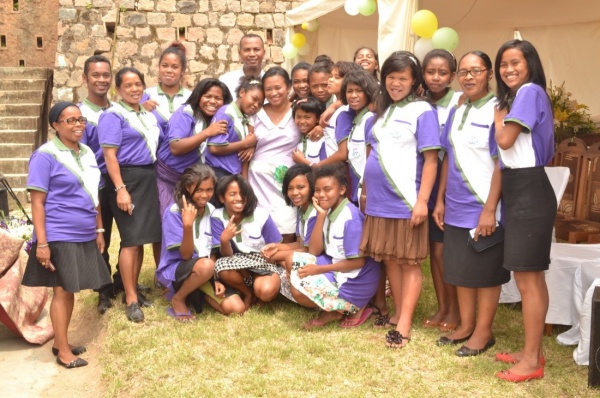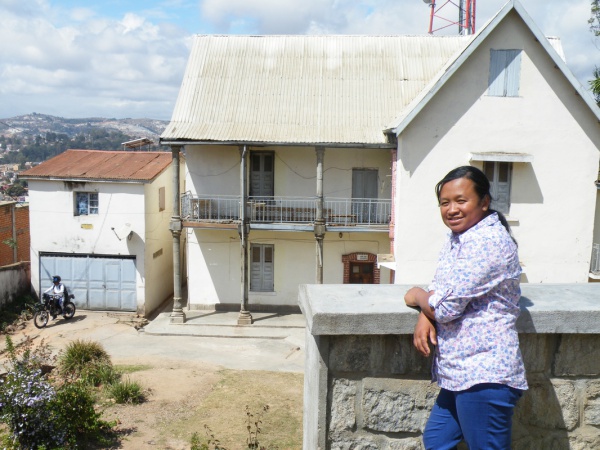Akany Avoko Faravohitra
Akany Avoko Faravohitra is a children's home for girls and young Malagasy females located in Antananarivo. The home was founded in 1963 after extensive flooding in Madagascar's capital. Over the last years, the big house sitting high on a hill has fallen into disrepair. But since September 2015, Mrs Ivelohanta Randrianarimalala is leading a project to re-establish the home for the girls.
The name Akany Avoko Faravohitra can be translated with Akany meaning centre, Avoko is the name of a flower from Madagascar and Faravohitra is a suburb of Antananarivo.
After a lot of work and effort by Mrs Randrianarimalala and her team and supporters, the home officially opened its doors on 15th March 2016. However, the children's home still faces further renovation works and running costs. Therefore donations are very much appreciated. It costs about EUR 40 a month to sponsor a child for care, food, shelter and education.
Address / Contact details
AKANY AVOKO FARAVOHITRA
Lot II J 9 Faravohitra ambony
33 Bis Rue Joël RAKOTOMALALA
Antananarivo
Madagascar
Tel: +261 (0)33 1268659 (mobile) or +261 (0)34 1168659
Email: contact.avoko@gmail.com
Website: www.avokofaravohitra.com
Full Project Details
Brief history
AkanyAvokoFaravohitra was founded in 1963 after the big floods in Antananarivo. It was set up to receive underage young girls (from 5 to 18 years old) to be cared for and educated for a limited period of time. The girls are placed by the judges at the juvenile court and it is them also who are consulted when the staff feels that a girl is ready to return to her family or is able to take her place in society. The children's home can accommodate about 40 girls.
What structures assure the life of the childrend's home?
The FFPM (Federation of Protestant Churches in Madagascar) is in charge of running the children's home, the Ministry of Justice is responsible for protecting human rights and the Ministry of Population cares for the children's home and its work. Those three institutions are responsible for the supervision of the home.
Who benefits from the children's home?
Social Cases - young girls who are victims of social problems: abused children who have suffered mentally and physically, those who are lost, those whose character and behaviour causes problems in the family or society, those who refuse to go to school, those who run away from home, those who have problems with drugs, etc.
Penal Cases - girls who are awaiting trial.
Home cases - young girls (or young boys) who need moral and financial support to enable them to continue their studies or apprenticeships and who remain with their families.
All Malagasy children who fall into one of these categories are taken in, with no discrimination as to faith or race or social class, but who agree to the conditions of education provided by the children's home.
How do the children arrive at the home?
Social Cases - parents or guardians of the child contact the social services who bring the case to the judges at the juvenile court who thereafter investigate the case and decide whether the child should be placed at the children's home.
Penal Cases - the judges at the juvenile court investigate the case and see whether a girl should be placed at the children's home while she waits for her court hearing, so that she can be protected and also so that she can be called for further investigation.
What is the educational process?
For those who are accommodated at the home
- Reception of the girl sent by the juvenile courts.
- Finding her educational level (for further study or as preparation for work).
- Making visits to her home and family.
- Deciding on a suitable education for her for the time of her stay at the children's home with a view to her eventual reintegration into society.
- Training for parents or those who will be responsible for her when she leaves the home.
- Moral and practical preparation for the child to return to the family.
- Home visits for family celebrations or for other reasons
- Making reports for the judges at the juvenile courts as to a girl's progress and suitability for return to the family.
- Attending the court case.
- Return to the family.
- Follow-up depending on the case - continuation of studies or training or starting work.
For home cases
- Investigation as to the child's background.
- Planning the education of the child.
- Find a sponsor who will support the child financially.
- Training for parents.
- Follow the education and progress of the child.
How long will a girl stay at AkanyAkovo?
Social cases - about 2 years ideally, but this also depends on how well the preparation for a return
to the family and into society is going.
Penal cases - his depends on the time waiting for the court case to come up, but if a girl has been investigated twice, a request could be made for the girl to be allowed to go home.
Who is in charge?
Someone who is placed by the Headquarters of one of the members of the Protestant Federation - either FJKM (Reformed) or Lutheran. The person chosen then becomes a worker of the FFPM. This person then chooses a Technical Committee which is approved by the FFPM and is also responsible for recruiting staff.
Mrs Ivelohanta RAZAFINDRASOA was chosen to run the AkanyAvokoFaravohitra from 2015-2022. She is a Christian from the FJKM church. She is a social worker and has a Masters degree in social work. She has 9 years experience in education and administration. She followed a Youth Leadership Training Programme in 2011 and is a leading member of the scout movement. She is married and has two children.
What is the vision?
The aim of all education is that those children being cared for should have the freedom and possibility of finding their full potential in life and work for their own fulfilment and that of those around them, capable of facing life's problems.
Objectives
By 2022, AkanyAvokoFaravohitra will have cared for about 350 girls who will be able to be independent and bring progress to their family and to those in their neighbourhood.
To be a place of excellence and a model for progress and education.
What is the mission?
1st section: Health
- A healthy diet corresponding to the age and physical needs
- Clean water
- Prevention from illness (vaccinations)
- Medication
- Clothing
- Sport
2nd section: Education
- Getting a birth certificate if the girl does not already have one
- Freedom to go to school
- Education on site (basic literacy)
- Work training: Hairdressing / cookery / sewing / different handicrafts
- Gardening and farming
- Training for parents
3rd section: Humanities
- Languages: Malagasy / French / English
- Improving talents: Music / dance / theatre / art
4th section: Spiritual
- Bible teaching at the children's home
- Link to local churches: Baptism preparation, Sunday school, church groups, confirmation classes, Sunday services
Principles of protection
- Respect for human rights
- Respect for the rights of the child
- Respect for the structure of society
- Respect for the ethics of social work
- Respect for the rules of the children's home
- Non-political
Staff
- Permanent staff (6)
- Part-time staff
- Volunteers (national and international)
What are the current problems? - in 2015
- Part of the building has fallen down so the children have had to be accommodated in another home for their own safety.
- The building is unsafe.
- The protective wall has fallen down.
- The toilets are in need of complete renovation.
- All the equipment needs replacing including the beds.
- There is no clear management structure.
- There are many debts.
- There is no regular income.
- The legal papers are not clear.
What are the solutions?
- Establishing a plan for the reconstruction and for a long term plan.
- Finding supporters both in Madagascar and abroad.
- Publicize the work of the children's home both in Madagascar and abroad.
What are the priorities?
In the 6 months from August to December 2015:
- Reconstruction of the building from outside
- Reconstruction of the building inside
- Improving the site:
- Rooms for the girls
- Shower room
- Toilet
- Offices
- Reconstruction of the fences
- Setting up the internal running of the children's home
- Get connected to the water supply
Plan of action for making the children's home work
First year: January till December 2016
- Having someone to assure the work in general
- Receiving volunteers from abroad and locally
- Receiving visitors
- Finding sponsors for each girl
- Finding places where the girls can train and do practical training
- Holidays at the seaside for resident girls
- Seaside holidays for external girls
- Finish all repair work
Second year to the sixth year (2017-2022)
- Find permanent sponsors
- Increase supporters both in Madagascar and abroad
- Construction of a building for volunteers and for apprentices
- Construction of a house for the warden
- Finding long-term financial support from Madagascar
- Twinning with overseas partners
- Completion of all legal papers
- Helping other homes (twinning with other homes in Madagascar)
Conditions of help
Individuals, groups, churches in Madagascar or abroad, must:
- Respect human rights and the rights of the child
- Do not take part in party politics
- Do no try to impose their particular ideas
What are the ways to support the home?
- By bank account, stating what in particular should be supported (child sponsor, building work, etc.)
- Details of children who need sponsorship can be provided, as well as details of other projects which need support.

